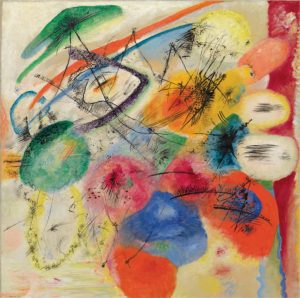
 PurimBurst, 1993 / 5753
PurimBurst, 1993 / 5753Sin fragments consciousness, and narrows it. It tunnels vision and disrupts the passage from inner beauty to outer form. Any act whose intention even subtly conceals G-d’s simple oneness and perfect goodness contains sin.
Every “thing” and moment, both ancient and modern, has its source in the Torah. The sages ask, “What is Haman’s root in Scripture?” [1] What loosed his energy into the world that it should join the queue of unfolding lives and appear, millenniums later, in the Purim story?
Our sages identify the first rebuke of creation’s history as the critical moment. The serpent seduced Adam and Chava to eat from the forbidden Tree of Knowledge.[2] They sinned and reality shattered into hundreds and thousands of pieces. Their own consciousness, which shone “from one end of the world to the other,” also collapsed—its vision now restricted to one slice at a time.[3]
This was a great shock. They never imagined the consequences would be so great (or so painful).[4] They felt shame and hid from the Presence of G-d.[5] It is here, when they face their Creator after their sin, and He speaks rebuke, that the energy of Haman enters the world.
From (המן)[6] the very tree which I had commanded you not to eat from it, have you eaten?[7]
Yet, paradoxically, the Sod Yesharim,[8] these very same words birthed Haman’s counterpart in holiness. They are also the source of the desert manna (המן), the spiritual “food of faith” that nourished our forty year transition from Egypt to Israel.[9] It had taste and smell (which are pleasures of soul) but no gastronomic satiation of body. It was completely absorbed, we passed no waste.[10]
Now the Tree of Knowledge, says Rav Tsadok, is not a tree, or a food, or a “thing” at all. Rather it is a way of eating. When a person takes self-conscious pleasure from the world he falls in that moment from G-d consciousness. He has eaten from The Tree of Knowledge.[11] This is the most subtle level of sin. It is called “eating in unholiness” and taints every act (even mitzvot), for in this post-Edenic world, no one escapes the pleasure principle, except in rare moments.
The pleasure itself is not the problem, rather our way of “taking” it. From the unselfconscious rapture that pokes in and out of life when we are at one with the moment, or the music, or the prayer, or the landscape, we can glimpse the idea of holy pleasure.[12] But when we grab it, to possess it, or to swallow it, we fall into unholiness.
Tsadikim do all for the sake of heaven, for the sake of giving pleasure to their G‑d.[13] They take nothing for themselves. They only eat מן (manna).
We are all, without exception, tsadikim.[14] And Haman (המן) insures that we, too, only eat מן (manna). Thus Purim begins with the kings feast where the Jews ate in unholiness.[15] Ever alert to the slightest gorging of pleasure, Haman burns it out with his opposite measure of terrors, sufferings and losses. In the end, when we cross the finish line, all that’s left is the pure point of giving-pleasure-to-Hashem that was our hidden motive all along. The debits cancel the credits, and it is clear that we were always only eating מן (manna).
On Purim we transcend the Tree of Knowledge and self-consciousness altogether (עד דלא ידע…) and our partaking of the world is then in the manner of tsadikim. It is literally unselfconscious.[16] There is no more Haman (המן). Our wine feast, too, is then only מן (manna).
[1] Chulin 139b.
[2] Genesis 3.
[3] Yalkut Shimoni 28. Also see, Evolutionary Creationism, Torah Solves the Riddle of Missing Links.
[4] R. Eliyahu Dessler, Michtav MeEliyahu, II:141.
[5] Genesis 3:8.
[6] There are three homonyms of the Hebrew word, המן (haman). See PurimThemes p. 19.
[7] Genesis 3:11.
[8] R. Gershon Chanock Lainer, Sod Yesharim, Purim 5.
[9] Zohar II:62a.
[10] Mechilta.
[11] R. Tsadok HaKohen, Pri Tsadik, Genesis 8.
[12] R. Dov Ber, Treatise on Ecstacy, chapter 1. See Eating as Tikun by Susan Schneider, available at: www.amyisrael. co.il/ smallvoice/.
[13] R. Shneur Zalman of Liadi, Likutei Amarim (Tanya), chapter 39.
[14] Isaiah 60:21; Sanhedrin 90a; Leshem, Sefer HVS 6:5.
[15] The Purim story opens with a 180-day long feast that Achashverosh provided for the nobles of his kingdom. At the end of this six-month bash he invited the citizens of his capital city (Shushan) to join him for a last week of celebration. Obviously the food was not kosher and Jews should not have gone. Yet, since their refusal to attend would have insulted the king and endangered their safety, Jewish law did permit (and, perhaps, even require) them to attend and even to eat the non kosher food served there. Yet, their love of G-d and His Torah should have dampened their pleasure in Achashverosh’s non-kosher banquet. This, says the Midrash, was their sin. Not their attending, not their eating, but the unabashed pleasure they took from these forbidden foods. Pirkey Levanon, quoted in Yaynah shel Torah (Jerusalem 1954).
[16] See PurimThemes, 18.